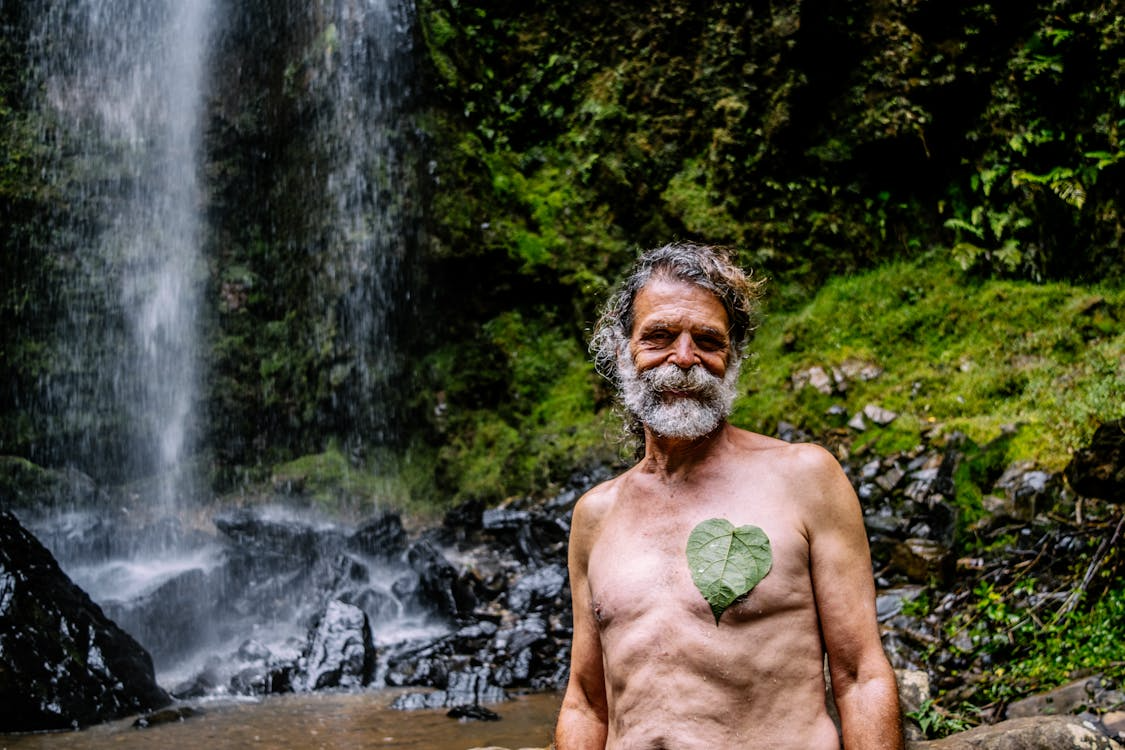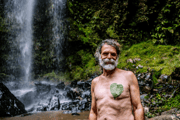
A 57-year-old French-Australian security consultant hikes through the bush wearing nothing but boots and socks.
His daily ritual turns heads, but for him, it is both freedom and meditation.
Vincent Marty believes Australians are decades behind Europe when it comes to public nudity—and he wants to change that.
Vincent Marty splits his time between running a cleaning business in New South Wales and what he considers his real calling: building a naturist movement that could reshape Australian attitudes towards the human body.
The grandfather’s routine might seem unconventional—walking up to 35 kilometres naked through the bush—but he said it was a practice of mindfulness and connection.
'For me, nude hiking is both freedom and health,' Vincent explained.
'By the time I stop, remove my shoes and socks, and walk barefoot, I feel completely part of nature. It feels like a walking meditation.'
Born in southwest France, Vincent’s naturist journey began at age 12, spending summers clothes-free at rivers and in forests.
Later, he visited naturist villages like Cap d'Agde, where tens of thousands lived nude every summer.
'That showed me that naturism wasn't fringe—it was cultural, healthy, and normal.'
A Tale of Two Cultures
'Australia has the landscapes and climate to do the same [as Europe], but instead we treat harmless nudity as indecency.'
Vincent noted that while Australia had a generally laid-back culture, attitudes toward nudity were still shaped by legal and social expectations.
The patchwork of state-based laws meant many Australians were unaware that public nudity could carry penalties.
Understanding Australia’s nudity laws required navigating a complex legal landscape.
Many people assumed a single federal law governed public nudity, but in reality, enforcement fell to individual states and territories.
Penalties could be surprisingly harsh, including maximum imprisonment terms of six months, with fines dependent on circumstances.
Offences committed near children were particularly likely to result in punishment.
What’s actually illegal in Australia?
In Australia, indecent exposure laws only referred to the genital area.
However, if behaviour was deemed 'offensive' to the surroundings, especially near children, it could breach state-based Summary Offences Acts.
The key distinction was between simple nudity and lewd behaviour.
Gender and Legal Discrepancies
Gender discrimination in these laws remained a contentious issue.
Men could be topless in public anywhere, but women could not.
Activists and human rights advocates argued the rules were discriminatory.
Federal-level discussions within the Australian Human Rights Commission were slowly pushing toward gender neutrality, but enforcement differences still existed.
Health and Wellbeing Benefits
Vincent’s campaign extended beyond legal reform.
His 20-35 kilometre hikes provided exercise and improved mental health, while naturism was scientifically linked to body confidence, stress reduction, and mindfulness.
He described his nude hiking as a 'walking meditation' that connected physical activity with nature.
Campaigning for Change
Through his organisation NaturismRE, Vincent launched multiple campaigns targeting legislators.
His petition proposed the Public Decency and Nudity Clarification Act 2025, aiming to amend legislation to differentiate public nudity from lewd behaviour, promoting clarity and inclusivity across Australia.
What Vincent’s campaign sought to achieve
- Legal distinction between nudity and lewd behaviour
- Designated clothing-optional areas in national parks
- Recognition of naturism as a legitimate lifestyle choice
- Protection from discrimination for naturist practitioners
- Education about body positivity and nature connection
Public Reactions and Legal Options
Despite potential public backlash, Vincent reported mostly positive encounters during his 45 years of nude hiking.
'People always stop, and the first thing they ask is: 'Are you OK?' because they don't know what to say.
Then, as I explain my lifestyle, they smile, chat, or even admit they've skinny-dipped before.
'I've never had a negative encounter.'
Attitudes toward nudity had evolved, particularly on beaches, where topless sunbathers were increasingly common in cities like Sydney and Melbourne.
Legal options existed for naturists, including Maslin Beach in South Australia, Kings Beach in Byron Bay, and Sunnyside North Beach in Victoria’s Port Phillip Bay.
However, iconic locations faced closures, such as Tyagarah Beach in Byron Bay despite an 8,000-strong petition.
Did you know?
Police enforcement of outdated nudity laws Police time and taxpayer money were often wasted enforcing outdated nudity laws, encouraging selective enforcement and unfair targeting of naturists.
Looking Ahead
Vincent envisioned naturism access in bushland, along riverbanks, in sections of national parks, and parts of city harbours and parks.
While the movement faced practical challenges, he remained optimistic about changing attitudes.
'For me, naturism is not about shock or rebellion. It's about freedom, equality, respect, and reconnecting with nature.'
What This Means For You
Vincent Marty campaigns to modernise Australian attitudes toward public nudity, highlighting how current laws are inconsistent, state-based, and often outdated.
He emphasises that naturism provides physical, mental, and social health benefits, offering a unique way to connect with nature and improve wellbeing.
While legal clothing-optional areas do exist, ongoing closures show the challenges faced by the naturist community.
This raises a question about personal freedom and lifestyle choices—could embracing a more open approach to nudity enhance your connection with nature, health, and overall sense of freedom?
If you found Vincent Marty’s journey into naturism thought-provoking, there’s another story that highlights how public nudity can spark curiosity and conversation in real-life settings.
A large-scale event saw hundreds of people embrace body freedom in a striking public location, showing how such gatherings can challenge perceptions and generate lively discussion.
Exploring this story provides a tangible example of how nudity intersects with culture, legality, and personal expression beyond isolated experiences.
Read more: Thousands of Aussies stripped naked on this bridge! Why?
Vincent Marty, 57, is leading a naturist campaign in Australia — Profile of Vincent Marty, a French-Australian promoting public nudity reform through hiking and advocacy.
https://www.dailymail.co.uk/news/article-15109401/Vincent-Marty-naturist-Australia.html
Petition · DRAFT BILL AUSTRALIAN PUBLIC DECENCY AND NUDITY CLARIFICATION BILL 2025—Australia — Outlines Vincent Marty’s petition to amend Australian public nudity laws to distinguish harmless nudity from lewd behaviour.
https://www.change.org/p/draft-bill-australian-public-decency-and-nudity-clarification-bill-2025
Nudism Laws in Australia 2025 : Complete Guide | Sandee — Detailed overview of public nudity laws across Australian states and territories, highlighting legal options and restrictions.
https://sandee.com/blog/nudism-laws-in-australia
Topless on Australian Beaches: 2025 Legal, Cultural & Practical Guide | AHL Legal — Explains state-based enforcement of public nudity laws, gender differences, and evolving beach culture in Australia.
https://ahllegal.com/en/news/588
Public nudity and criminal offences | ANCC — Provides legal details on maximum penalties for public nudity offences and circumstances where offenders are prosecuted.
https://www.australiannationalcharactercheck.com.au/public-nudity-criminal-offence-NSW.html
Petitions & Campaigns — The Resurgence of Naturism: A Global Movement—NaturismRe — Highlights NaturismRE’s nationwide efforts to promote body freedom, challenge discrimination, and secure legal recognition for naturists.
https://www.naturismre.com/petitions-campaigns
Have you ever considered how much your personal freedoms are shaped by outdated laws?







